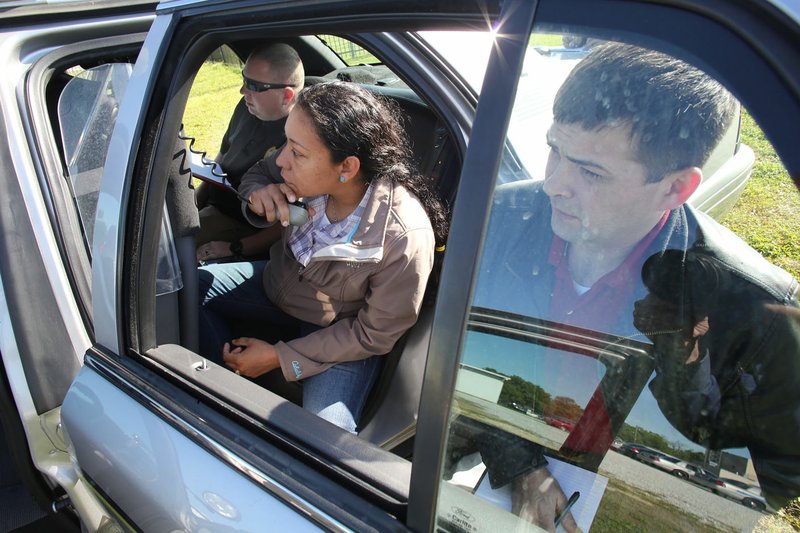SPRINGDALE -- The negotiator on the loudspeaker used his most soothing voice to ask the man to roll down his car window and talk to him. In the training scenario Friday morning, police had stopped the man on a traffic violation, but now the driver had a gun he was holding under his own chin.
"Sir, it seems like you've got a lot on your mind," the negotiator said. "I don't want you to hurt yourself." He asked the man to put down the gun. Instead, the man started the car, and all four police officers flinched.
Fast fact
Negotiators use “active listening skills” as a core technique for talking with people in a crisis and deescalating the situation. Negotiators try to hear the words the person in crisis use and understand the complete message the person is getting at. The idea is to demonstrate empathy and build rapport.
Source: Staff report
The training scenario was part of the Basic Crisis Negotiators Course happening at the Springdale Police Department this week. The officers, using the car for cover, were practicing working together to find out who the man was and why he was there. They needed to build rapport to convince the man to give up peacefully.
About 16 police officers from Springdale, Rogers and Fayetteville participated in training exercises, forums and critiques Thursday and Friday, said Kyle Naish, a Springdale detective who has worked on the city's negotiation team for four years.
The four largest Northwest Arkansas cities and Benton and Washington counties have negotiators, Naish said. Four officers from Rogers participated in the basic course Friday but their training will continue, Rogers police spokesman Keith Foster said in a message. About four officers participated from Springdale.
Foster did not attend the event Friday.
Police rotated between three scenarios on Friday: a traffic stop in which a man has a gun, a man barricaded inside a house with two hostages and a person threatening to jump from a building. The idea is to practice learning how to listen carefully, mirror language and help the person in the crisis, Naish said.
"The reality is we want to influence positive change," he said. "We are looking to get them help. I took this job because I want to help people."
Randall Rogan, an expert on crisis negotiations from Wake Forest University, said in a 2013 report between 85 percent and 90 percent of hostage situations are resolved successfully.
Springdale has about 12 negotiators who work in various departments, including the criminal division and patrol, but have secondary duties as negotiators, Naish said. Four of those negotiators were added to the team in the past month, he said.
Not all negotiators respond to every crisis, Naish said. That depends on factors including officers' other duties and matching certain negotiators with people in crisis, he said. An officer with military experience, for example, may better connect with a veteran who is in a crisis, Naish said.
Negotiators are involved in handling situations like suicide threats, mental illness episodes and hostage situations, Naish said. Those calls for help also are among the most dangerous for law enforcement officers, police have said. A Washington County deputy was shot last year after being called to a home where a man was threatening suicide.
The FBI reports that only 4 percent percent of incidents involving law enforcement negotiators involve a hostage.
In Springdale, negotiators are called about once a month to handle a crisis event, Naish said. Negotiations can last hours, he said.
About 35 percent of negotiations nationally last two to four hours and more than half occur at private residences, according to FBI data.
Most people think about SWAT during crisis events, but negotiators are the counterparts that keep everyone safer, Naish said. Officers who can listen and connect with the person can create peaceful resolutions, he said.
Back at the traffic stop, the police officers switched who would be the lead negotiator after the man in the car refused to talk with the first negotiator any more. The negotiator had lost the man's trust inadvertently. Once the trust is broken, negotiators must switch, said Cpl. Jason Renfrow, who was overseeing the scenario.
Officer Tim Baker started the process over and slowly convinced the man he cares what happens to him. The techniques used in the negotiation training are different than what police learn in officer training, Baker said. Officers learn to communicate without just giving commands, he said.
"You're learning to talk with the person, and in a way, get to know the person. Instead of guns out, you get to use words," Baker said. "It was a very good learning experience."
NW News on 05/06/2017
